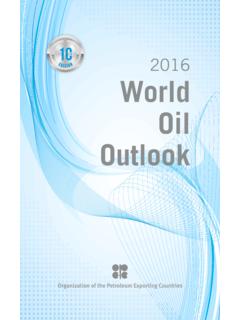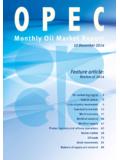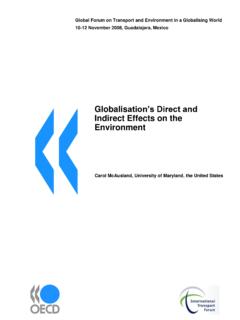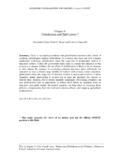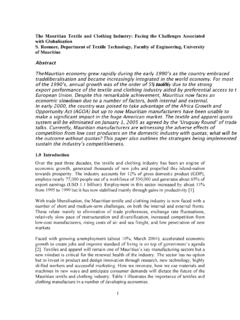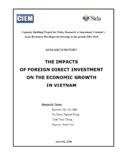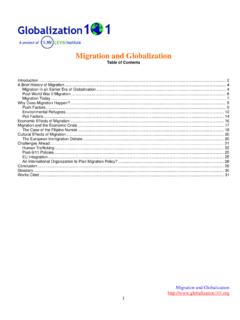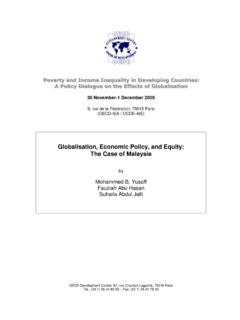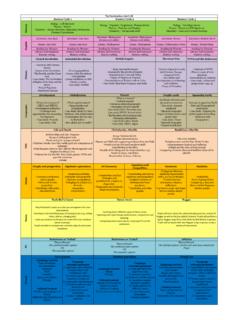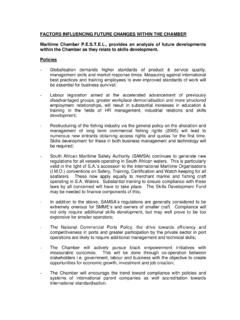Transcription of Statute (Statue (28.2.12) for web - OPEC : Home
1 Organization of the Petroleum Exporting Countries Statute 2012. OPEC Statute OPEC Secretariat Organization of the Petroleum Exporting Countries Helferstorferstrasse 17, A-1010 Vienna, Austria Telephone: +43 1 211 12-0. Secretariat fax: +43 1 216 43 20. PR & Information Department fax: +43 1 211 12-5081. E-mail: Website: Contents CHAPTER I Organization and Objectives 1. CHAPTER II Membership 3. CHAPTER III Organs 5. I. The Conference 5. II. The Board of Governors 9. III. The Secretariat 12. CHAPTER IV Consultative Meetings and Specialized Organs 19. CHAPTER V Financial Provisions 21. CHAPTER VI Additional Provisions 22.
2 For amendments to the Statute , please see pages 23 24. The original text of the Organization's Statute was approved by the Conference in January 1961 in Caracas Resolution CHAPTER I. Organization and Objectives Article 1. The Organization of the Petroleum Exporting Countries (OPEC), hereinafter referred to as the Organization , created as a permanent intergovernmental organization in conformity with the Resolutions of the Conference of the Representatives of the Governments of Iran, Iraq, Kuwait, Saudi Arabia and Venezuela, held in Baghdad from Septem- ber 10 to 14, 1960, shall carry out its functions in accordance with the provisions set forth hereunder.
3 Article 2. A. The principal aim of the Organization shall be the coordination and unification of the petroleum policies of Member Countries and the determination of the best means for safeguarding their interests, individually and collectively. B. The Organization shall devise ways and means of ensuring the stabilization of prices in international oil markets with a view to eliminating harmful and unnecessary fluctuations. C. Due regard shall be given at all times to the interests of the pro- ducing nations and to the necessity of securing a steady income to the producing countries; an efficient, economic and regular supply of petroleum to consuming nations; and a fair return on their capital to those investing in the petroleum industry.
4 1. Article 3. The Organization shall be guided by the principle of the sover- eign equality of its Member Countries. Member Countries shall fulfil, in good faith, the obligations assumed by them in accordance with this Statute . Article 4. If, as a result of the application of any decision of the Organiza- tion, sanctions are employed, directly or indirectly, by any interested company or companies against one or more Member Countries, no other Member shall accept any offer of a beneficial treatment, whether in the form of an increase in oil exports or in an improvement in prices, which may be made to it by such interested company or companies with the intention of discouraging the application of the decision of the Organization.
5 Article 5. The Organization shall have its Headquarters at the place the Conference decides upon. Article 6. English shall be the official language of the Organization. 2. CHAPTER II. Membership Article 7. A. Founder Members of the Organization are those countries which were represented at the First Conference, held in Baghdad, and which signed the original agreement of the establishment of the Organization. B. Full Members shall be the Founder Members, as well as those countries whose application for membership has been accepted by the Conference. C. Any other country with a substantial net export of crude petroleum, which has fundamentally similar interests to those of Member Countries, may become a Full Member of the Organization, if accepted by a majority of three-fourths of Full Members, includ- ing the concurrent vote of all Founder Members.
6 D. A net petroleum-exporting country, which does not qualify for membership under paragraph C above, may nevertheless be admitted as an Associate Member by the Conference under such special conditions as may be prescribed by the Conference, if accepted by a majority of three-fourths, including the concurrent vote of all Founder Members. No country may be admitted to Associate Membership which does not fundamentally have interests and aims similar to those of Member Countries. 3. E. Associate Members may be invited by the Conference to attend any Meeting of a Conference, the Board of Governors or Con- sultative Meetings and to participate in their deliberations without the right to vote.
7 They are, however, fully entitled to benefit from all general facilities of the Secretariat, including its publications and library, as any Full Member. F. Whenever the words Members or Member Countries occur in this Statute , they mean a Full Member of the Organization, unless the context demonstrates to the contrary. Article 8. A. No Member of the Organization may withdraw from membership without giving notice of its intention to do so to the Conference. Such notice shall take effect at the beginning of the next calendar year after the date of its receipt by the Conference, subject to the Member having at that time fulfilled all financial obligations arising out of its membership.
8 B. In the event of any country having ceased to be a Member of the Organization, its readmission to membership shall be made in accordance with Article 7, paragraph C. 4. CHAPTER III. Organs Article 9. The Organization shall have three organs: I. The Conference;. II. The Board of Governors; and III. The Secretariat. I. The Conference Article 10. The Conference shall be the supreme authority of the Organiza- tion. Article 11. A. The Conference shall consist of delegations representing the Member Countries. A delegation may consist of one or more delegates, as well as advisers and observers.
9 When a delegation consists of more than one person, the appointing country shall nominate one person as the Head of the Delegation. 5. B. Each Member Country should be represented at all Conferences;. however, a quorum of three-quarters of Member Countries shall be necessary for holding a Conference. C. Each Full Member Country shall have one vote. All decisions of the Conference, other than on procedural matters, shall require the unanimous agreement of all Full Members. The Conference Resolutions shall become effective after 30 days from the conclusion of the Meeting, or after such period as the Con- ference may decide unless, within the said period, the Secretariat receives notification from Member Countries to the contrary.
10 In the case of a Full Member being absent from the Meeting of the Conference, the Resolutions of the Conference shall become effective unless the Secretariat receives a notification to the contrary from the said Member, at least ten days before the date fixed for publication of the Resolutions. D. A non-Member country may be invited to attend a Conference as Observer, if the Conference so decides. Article 12. The Conference shall hold two Ordinary Meetings a year. How- ever, an Extraordinary Meeting of the Conference may be convened at the request of a Member Country by the Secretary General, after consultation with the President and approval by a simple majority of the Member Countries.
